Destinations of leavers
Find out more about some of our graduates and researchers below.
|
Tom Barber, Project Lead, NDE and Weld Engineering, BAE Systems
|
|
Nicolas Budyn, Ultrasonic & Signal Processing Specialist, Proceq Nicolas studied for an EngD in ultrasonic imaging using the multi-view Total Focusing Algorithm, completing in 2020. He now works as an Ultrasonic & Signal Processing Specialist for Proceq (Switzerland), which designs and produces nondestructive testing equipment. Having pursed doctoral studies in ultrasonic testing was essential for getting this position. |
|
Rob Malkin, Research Team Lead, Ultraleap Ltd
|
|
Asier Marzo, Lecturer in Computer Science, Public University of Navarre |
|
Maddy Nichols, Chief Operating Officer, Spin Up Science
|
|
Ali Safari, Research Associate, UNDT Group, University of Bristol
Image: Dr Ali Safari (on left) and the Pipebots project |
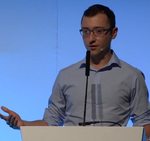 Tom studied for an EngD in the UNDT Group between 2012-2016 on the ultrasonic array inspection of non-ferrous small-bore welds, supervised by
Tom studied for an EngD in the UNDT Group between 2012-2016 on the ultrasonic array inspection of non-ferrous small-bore welds, supervised by 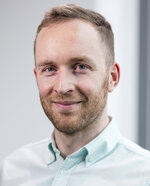 Rob studied at Bristol for a PhD in material science, completing in 2012; he used a lot of acoustic inspection, leading to a fascination with acoustics and NDT. He then took a post as a postdoctoral researcher in the UNDT Group to early 2020. During his time as researcher he was involved in three research projects i) looking at acoustic scattering as a method of characterising defects within metallic structures; ii) using acoustic imaging to survey the Fukushima nuclear accident site. He worked with teams in Japan and the UK and took some truly unforgettable visits to Japan's nuclear facilities; and iii) imaging defects in complex shapes. From April 2018, Rob worked part time in the UNDT team as well as being the Research Team Lead at
Rob studied at Bristol for a PhD in material science, completing in 2012; he used a lot of acoustic inspection, leading to a fascination with acoustics and NDT. He then took a post as a postdoctoral researcher in the UNDT Group to early 2020. During his time as researcher he was involved in three research projects i) looking at acoustic scattering as a method of characterising defects within metallic structures; ii) using acoustic imaging to survey the Fukushima nuclear accident site. He worked with teams in Japan and the UK and took some truly unforgettable visits to Japan's nuclear facilities; and iii) imaging defects in complex shapes. From April 2018, Rob worked part time in the UNDT team as well as being the Research Team Lead at 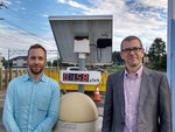 Image: Dr Rob Malkin and
Image: Dr Rob Malkin and 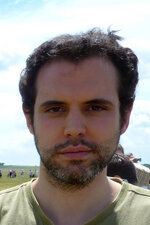 Asier was a postdoctoral researcher in the UNDT Group and is now a Lecturer in Computer Science at the
Asier was a postdoctoral researcher in the UNDT Group and is now a Lecturer in Computer Science at the 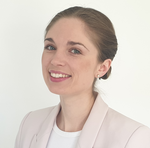 Working across engineering, physics and chemistry as part of her PhD in Functional Nanomaterials 2014-2018, Maddy used acoustic manipulation to fabricate ordered soft materials, with application in improving cell scaffolds for tissue engineering. Working within the UNDT group, she was exposed to projects that sparked her interest in exploring how to progress her research to have real world relevance and impact, which has led her into her role within
Working across engineering, physics and chemistry as part of her PhD in Functional Nanomaterials 2014-2018, Maddy used acoustic manipulation to fabricate ordered soft materials, with application in improving cell scaffolds for tissue engineering. Working within the UNDT group, she was exposed to projects that sparked her interest in exploring how to progress her research to have real world relevance and impact, which has led her into her role within 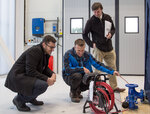 Ali's PhD at the University of Bristol 2015-2019 was on improving defect characterisation using ultrasonic phased arrays by better assessing and understating the characterisation methods and optimising arrays. His post-doc research has been within the
Ali's PhD at the University of Bristol 2015-2019 was on improving defect characterisation using ultrasonic phased arrays by better assessing and understating the characterisation methods and optimising arrays. His post-doc research has been within the